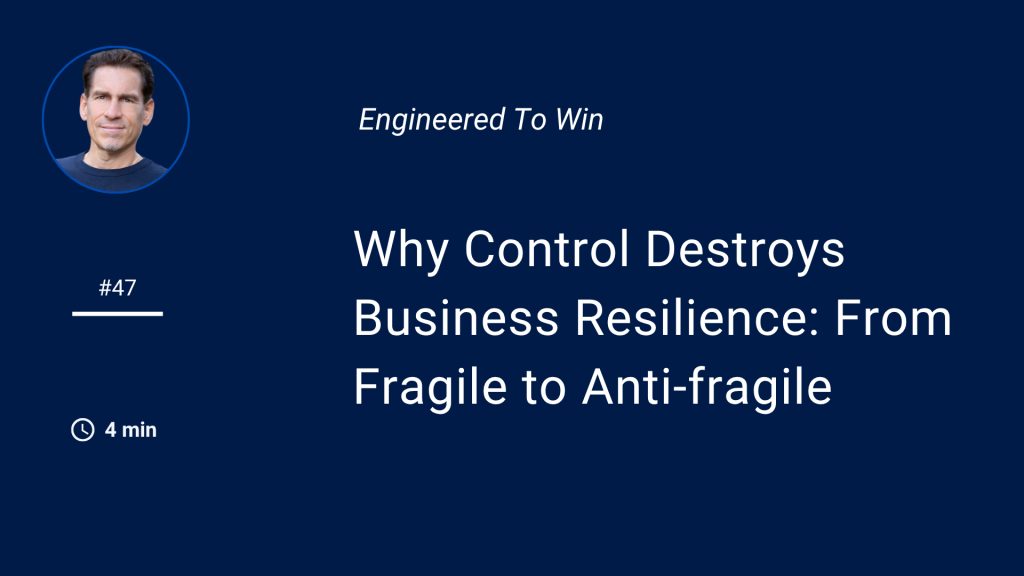You’re not fragile.
But your business is—because you're addicted to control.
If everything depends on you, you’ve built a fragile company.
This newsletter shows how to shift from dependency to anti-fragility—and why that’s the real superpower for founders.
You’re Not a Genius. You’re Just Addicted to Being Needed.
Let’s call it what it is:
You’re not leading. You’re hovering.
Like an overprotective dad who won’t let his kid ride the bike.
Why?
Because being in control feels safe.
Because if they don’t need you… who are you?
You think your team needs more training.
More clarity.
More urgency.
But here’s the hard truth:
→ You built the dependency.
→ You are the bottleneck.
→ Your ego is the control mechanism.
You feel important when they come to you.
You feel useful when you fix things.
You feel smart when they wait for your opinion.
But that’s not leadership.
That’s parenting.
If Everything Runs Through You, Nothing Is Built to Last
Let me break it down like you’re in sixth grade:
If your team keeps waiting for you?
→ That’s not leadership, that’s insecurity.
If you still approve every decision?
→ That’s not clarity, that’s control.
If the business breaks without you?
→ That’s not impressive, that’s embarrassing.
Here’s the kicker:
The more you’re needed…
The more fragile your business becomes.
Why Smart CEOs Confuse Control with Clarity
I once worked with a founder—we’ll call him Sean.
$8.5M ARR. Harvard MBA.
Everything flowed through him.
He called it: “staying close to the business.”
I called it: fear of letting go.
His team deferred decisions.
His strategic projects stalled.
His smartest people became passive.
He thought his intelligence kept things running.
But it was actually killing the system’s independence.
He wasn’t leading.
He was buffering.
Using his IQ like a firewall against fear.
→ Fear of losing relevance
→ Fear of being replaced
→ Fear of someone else screwing it up
Here’s the trap:
Control is about you.
Clarity is about the system.
What It Means to Build an Anti-fragile Business
Nassim Taleb defines anti-fragility as:
“Things that gain from disorder.”
Anti-fragile systems don’t just survive stress.
They get stronger because of it.
That means:
- You decentralize decisions
- You let your team wobble a little
- You build systems that don’t need you
When you babysit every move, you rob your business of its resilience.
How to Shift From Fragile to Anti-fragile
1. Stop centralizing every decision
Pick one recurring choice you usually approve—and delegate it.
Let them learn through ownership.
2. Build simple rules, not complex oversight
Install a 1-page scorecard.
Track decisions made—not tasks completed.
3. Install skin-in-the-game
Ownership only happens when the outcome matters to the person.
Give them space. Give them risk. Let them rise.
“Dependency is false safety.” — Dan LeFave
You don’t need to be smarter.
You need to be less needed.
1-Hour CEO Challenge: Delegate One Decision
Step 1:
Pick one recurring decision you always make.
Step 2:
Let them own it for the next 30 days.
Spend 10 minutes identifying who can take it.
Spend 20 minutes creating a simple rule or filter for them.
Bonus:
If it goes sideways, don’t fix it. Debrief it.
That’s anti-fragile thinking:
You protect it by strengthening it.
You don’t protect the system by shielding it.
The Research Backs It
“Anti-fragile systems benefit from shocks; they thrive in volatility.” — Nassim Taleb
✅ They use friction as feedback.
✅ They decentralize decision-making.
✅ They measure strength by how replaceable the leader is.
In anti-fragile systems, the leader isn’t the answer.
The system is.
Recommended Reading:
👉 How to Make Your Startup Anti-fragile – Chris Neumann
Related Insight: Why 10x Growth Demands Letting Go
If you’re serious about building an anti-fragile business, here’s your next read:
👉 Why 10x Growth Is Easier Than 2x (And Why Most CEOs Are Scaling the Wrong Game)
It breaks down why doing less — not more — is the path to sustainable scale.
And why systems that don’t depend on you aren’t just smart. They’re essential.
Closing Thought: Fragility Feels Like Relevance
You gain your life by losing it.
You gain your freedom by letting go.
That fear you feel when you’re not “in the loop”?
That’s not a warning sign.
That’s growth knocking.
Reflection Question:
Where are you confusing being essential with being effective this week?
Tool: Trust-Based Scorecard
Use a tool like Notion or ClickUp to create a trust-based scorecard.
It tracks:
→ Decisions made
→ Wobbles learned
→ Outcomes owned
Not tasks.
Not checklists.
Not approval gates.
It reprograms the system from “ask the CEO” to “act like an owner.”
Call to Action
Reply with one decision you’re offloading today.
Or forward this to a founder who keeps calling themselves the bottleneck but won’t admit they like it.
Next Week:
How to build an organizational nervous system that scales without you.

